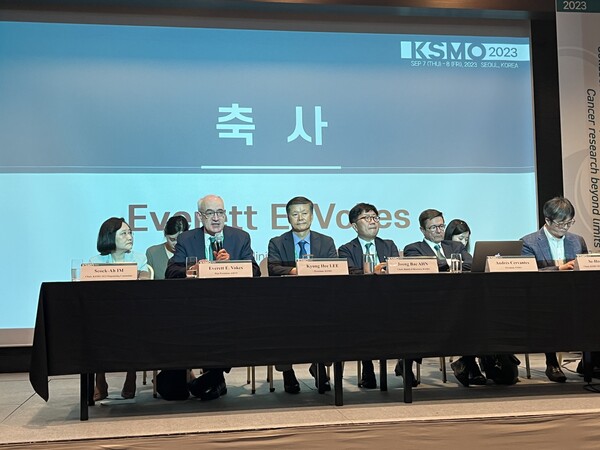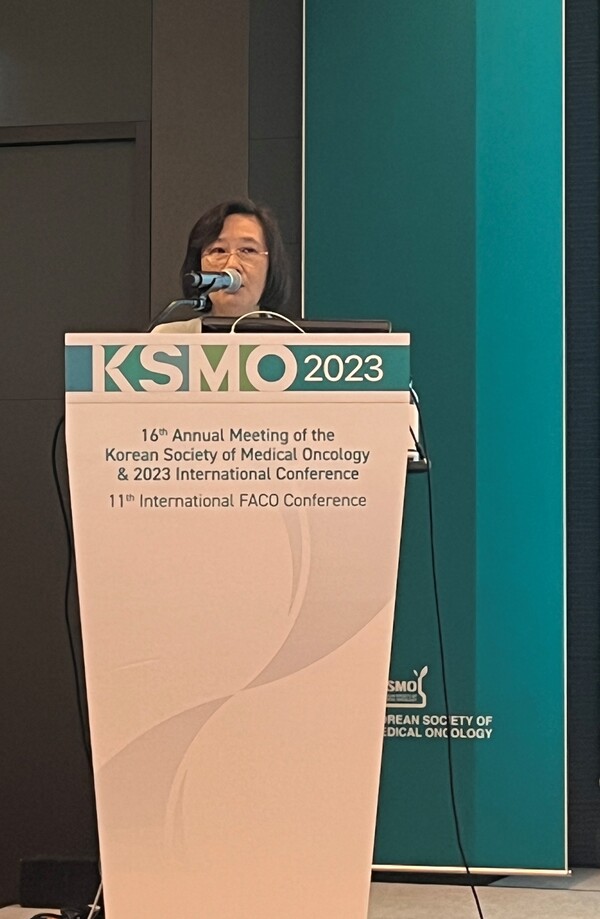The 16th Annual Meeting of the Korean Society of Medical Oncology (KSMO) and the 5th International Conference (KSMO 2023), kicked off at the Grand Walkerhill Seoul on Thursday to break down barriers to improve cancer treatment, discuss the future of medical oncology, and exchange new and diverse ideas.
The two-day international event, held both online and offline, attracted heated attention from the world’s renowned oncologists because top cancer societies such as the European Society for Medical Oncology (ESMO) and the American Society of Clinical Oncology (ASCO) held joint symposiums with KSMO.
Under the slogan, “Collaboration beyond borders, Cancer research beyond limits,” KSMO 2023 brought together over 2,000 participants from 45 countries, according to the event organizers.
By region, Asia had the highest number of participants, with 1,948 attendees from 18 countries, followed by North America with 43 people, Europe with 42, Africa with 13, Oceania with six, and South America with two.
A total of 537 abstracts will be presented.
In terms of speakers, China has the highest number with 175, followed by Korea with 120, Indonesia with 55, India with 50, and the Philippines with 40.

Everett E. Vokes, Past President of ASCO, said he used to participate in the previous KSMO international conferences virtually but joined the latest one in person this year.
“I think oncology in Korea has made tremendous progress and is now really recognized worldwide,” Vokes said at a press conference in Seoul.
The key takeaways from two ASCO+KSMO joint symposiums are discussions on rare genomic alterations and multimodality treatments, he said.
“Looking at the program, it’s very much at the top,” he told Korea Biomedical Review, adding that Korean investigators are making “very important contributions” to immunotherapies and genetic analyses of cancers.
Andres Cervantes, President of ESMO, echoed Vokes in praising the quality of the program.
“I am very impressed by the program, reflecting what Korean oncologists are doing,” said Cervantes at the press conference.
ESMO is delivering two joint symposiums with KSMO -- on multi-omics and immuno-oncology.
He noted that although ESMO is based in Europe, it is rather a global society with the number of its members exceeding 30,000. Among them, about 400 Korean oncologists are ESMO members, attending ESMO’s annual meeting in Madrid, Spain, and ESMO Asia in Singapore, he said.

Seock-Ah Im, Chair of KSMO 2023 Organizing Committee, highlighted the four plenary lectures that cannot be missed.
They are “Mechanisms of resistance to endocrine therapy in ER+ breast cancer” by Carlos L. Arteaga, Professor and Director of UT Soouthwestern Medical Center from the U.S.; “Mechanism of Action and Inflammatory Axis for Air Pollution Induced Non-Small Cell Lung Cancer” by Charles Swanton, Chief Clinician at Cancer Research UK and Principal Group Leader at the Francis Crick Institute from the U.K.; “SCRUM-MONSTAR & CIRCULATE- Japan platform to accelerate precision oncology innovations; achievement and perspective” by Takayuki Yoshino, Director of the Department of Gastroenterology and Gastrointestinal Oncology at National Cancer Center Hospital East from Japan; and “Breakthough in Targeted Therapy and Immunotherapy for the Treatment of Advanced Non-Small Cell Lung Cancer” by Roy S. Herbst, Director of Center for Thoracic Cancers, and Chief of Medical Oncology at Yale Cancer Center and Smilow Cancer Hospital from the U.S.
On Friday, there will be two Federation of Asian Clinical Oncology (FACO) sessions involving Korea, China, and Japan. One will be recent updates in colorectal cancer treatment, and the other, proposals for new FACO clinical trials.
“We have prepared various programs to enhance collaboration between world-class oncology societies, as well as joint symposiums with domestic and overseas cancer societies to maximize exchanges. I hope that everyone who participated in the event will gain useful information and ideas,” said Lee Kyung-hee, President of KSMO.

